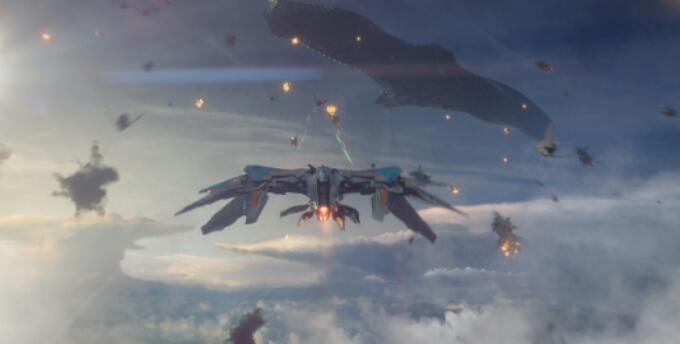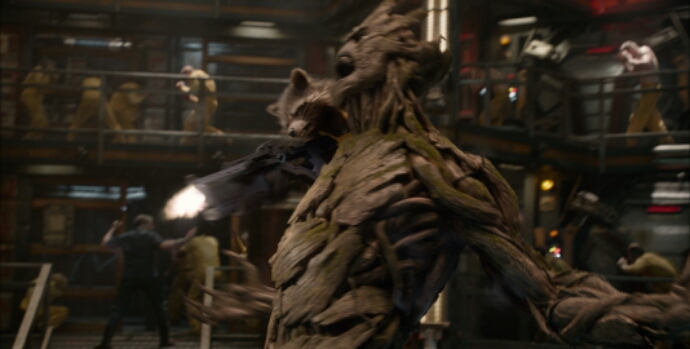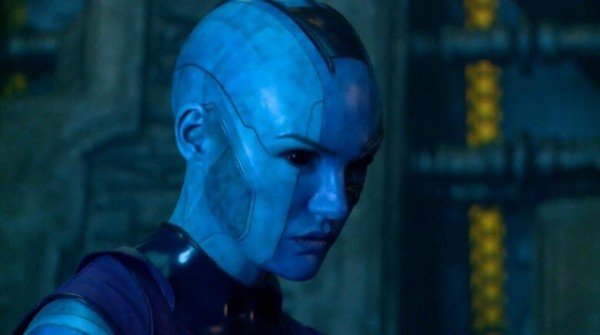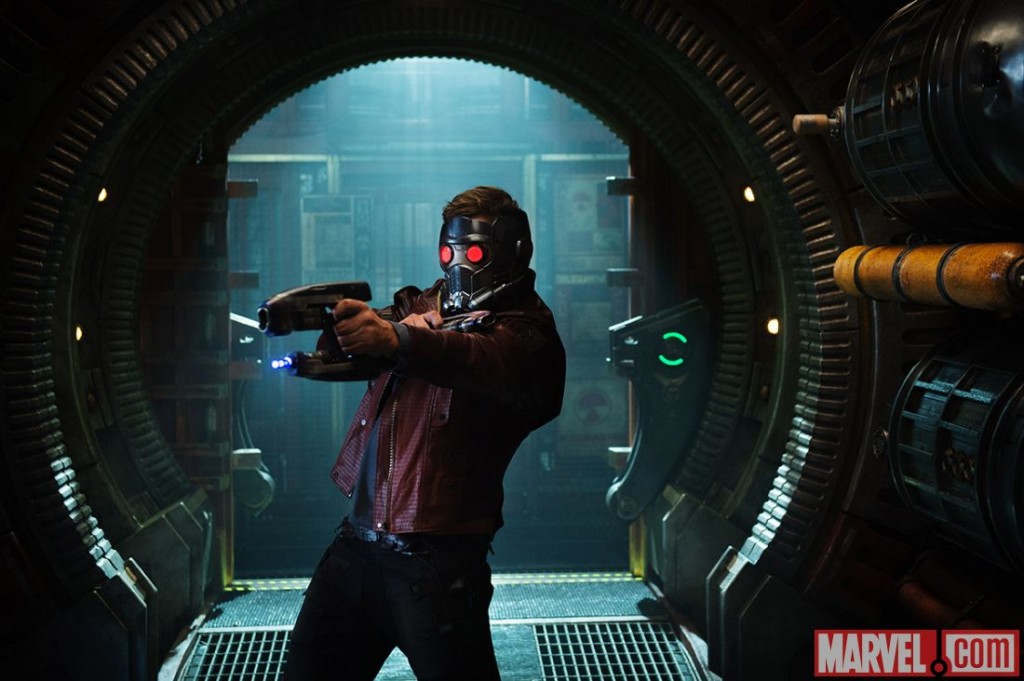*insert breathlessly positive review of Guardians here, plus Rocket joke*
There, that’s done with. It’s becoming more and more clear that the great mass of reviewers and fans have decided, yup, we like Guardians of the Galaxy. And that’s good. The film unquestionably earns it, with funny yet well-developed characters and well-conceived action sequences. In terms of box office, rather than just being the latest Marvel superhero coup, we can also read this as the revitalization of the space opera. While movies that start with the word “Star” tend to do well on their pre-established merits, Hollywood is much more comfortable doing a space horror story like Event Horizon or a military opus like Starship Troopers than an old-school romp through the cosmos. Even the more recent Star Trek and Star Wars movies have largely avoided large-scale clashes of fleets in favor of broadly defined characters with amazing individual abilities. In effect, they are superhero movies by way of space opera. This movie hits reverse.
It’s obviously a superhero movie, borrowing structure and continuity from the rest of the Marvelverse. But in this case it’s truly space opera by way of superhero movie, focusing on a broad ensemble and emphasizing the heroism of “ordinary” space cops and pirates as well. Marvel’s existing cosmic stories, while I’m only marginally familiar with them, provide an appropriate galactic backdrop for the events at hand. One danger of creating a new sci-fi universe is making it feel too small and provincial, but Marvel has size and history built in. But since it’s new to most of the audience, the writer and director also have a lot of creative freedom.
By combining the Marvel/Whedon character-and-humor-centric approach with a colorful, expansive space realm, the result is pretty much Serenity meets The Chronicles of Riddick. Star-Lord, like Malcolm Reynolds and Tony Stark before him, is the lovable rogue that serves as both audience identification point and the central core on which the story is built. In this capacity, despite his own quirks, Star-Lord ultimately exists to play semi-straight man to the much more over-the-top Drax, Rocket, and Groot. Drax is another stock character, Space Conan, but played in a delicious new way. As a member of a species that “doesn’t get metaphor,” and not a particularly socially adept individual at that, Drax brilliantly blunders his way though the film, going so far as to drunk-dial a supervillain. As the ditziest muscleman in the universe, the character is a brilliant leveraging of Batista’s talents.
Just as no one expected Drax to deliver so many laughs, it’s safe to say few expected Rocket Raccoon to be the character with the most pathos. At first glance, it’s Star-Lord who gets the most emotional blows to the solar plexus. But at least Peter Quill has a home, and friends who look like him. Bradley Cooper does an admirable job of remembering that no character is a joke to himself, and sells the character’s pain. As do the animators, in a wordless moment when Rocket is stripped and Quill sees his extensive cybernetic modifications. Rocket’s counterpart Groot is another great example of what can be done with digital characters these days. Vin “The Iron Friggin’ Giant” Diesel naturally wrings all he can out of a single sentence, but it’s Groot’s body language and expressions that provide most of the film’s laugh-out-loud and heartwarming moments. Still, his powers are used as deus ex machina quite a few times, and it’s hard not to be a little frustrated with a character whose powers are “anything as long as it’s plant themed.”
Unfortunately, and through no fault of actor Zoe Saldana at all, Gamora is the least interesting of the core five. I’m unsure if this is a restriction of the source material, but her story boxes her into an “earnest atoner” role. What’s worse, her significant character development happens before the movie even starts. With few opportunities to earn laughs or surprise, Gamora ends up playing straight man to the straight man (Star-Lord). Her rivalry with Karen Gillian’s Nebula is visually splendid, but without much substance. In the wake of Mass Effect’s resounding deconstruction of the “blue-skinned space babe,” it’s disappointing to see the trope played so straight and devoid of irony.
Unexpectedly stealing the show are non-Guardians John C. Reilly and Michael Rooker, who are effectively foils, embodying the forces of Law and those of Chaos that the Guardians can never fully embrace. Both appear to be rather third-rate villains at first, before revealing their humanity and excelling in the fight against ultimate evil. It is these characters that elevate the movie from being a spacier Fantastic Four into being a worthy entry to the space opera genre, because it is a hallmark of that genre—Babylon 5, Battlestar Galactica, Star Trek: DS9, Halo, Mass Effect—to unite the disparate against the dreadful.
Rooker’s Yondu and his Ravagers may have other comic antecedents, but to me their relationship with Quill is right out of Star Wars Legacy. A budding hero, last scion of a great family, has his destiny cut short by space pirates and he must ultimately harness them or destroy them to fulfill it. The unpredictable oscillations of Cade Skywalker and his surrogate father Rav ultimately lead to the latter’s demise, but the end of Guardians hints that Quill’s and Yondu’s final meeting will be of reconciliation. As for Reilly, his true comic talent may be as a straight man (yes even straighter than Gamora) as his police captain got more guffaws out of me than any of Reilly’s broader comic roles. His Nova Corps is wisely reimagined as a more traditional band of space cops, rather than the pseudo Green Lanterns of the comics. Without the Corps, the great ode to Star Wars that is the climax can’t be pulled off, nor the emotional surge of seeing natural enemies join hands without thought or word to defend each other. The brief relationship between Rocket and a hapless Nova pilot elevates both of them.
The most disappointing aspect of Guardians for me, in the context of space opera, is the over-familiarity of the setting. While the form is indeed well-worn, with many established tropes, it is in the details that such settings shine. Perhaps inherited from its source material, but no less disappointing, nearly all beings in the universe are essentially human (or tree or raccoon or dog or duck or del Toro). This is used effectively, by dialing the human traits of given characters up or down to allow the audience to form the proper reactions instantly. But in isolation, without more varied forms of life to play off, the universe feels bland, and of course it’s an instant deathblow to any remote sense of scientific credibility. It also makes the Nova Corps feel super whitebread next to their Lantern counterparts.
This over-familiarity also plays into the art direction. The created settings of the film are the typical bland, over-detailed environments that Hollywood can’t seem to get enough of post-Phantom Menace. A few details like the spinal fluid mines are impressive, but doesn’t elevate the various locations above “generic peaceful city,” “generic evil fortress,” and “generic hive of scum and villainy.” The asteroid location inherited from The Avengers feels fresher than the film’s own work. The one bright exception are the spaceships, which finally return to the brilliance of early Wars and Trek by focusing on a few standout shapes and colors, imbuing the vessels with personality. I wish the rest of the art direction had followed suit.
The major weakness of Guardians is the imposed plot structure. The film could have easily worked without the Infinity Stone. In fact, the focus on the Stone takes away from the conflict between the Xandarians and the Kree, which is forced into the background despite being Ronan’s motivation. The Stone does work in the context of the larger Marvel Movieverse, of course, but it’s hard to evaluate yet whether that was worth it yet. Dropping the Stone immediately frees us from the movie’s three most tiresome scenes (the Collector’s dull exposition on Knowhere, Ronan’s unnecessary elevation from super-power to uber-power, and the Power of Friendship part of the ending) and unshackles the movie from the Marvel Formula it shares with Thor, The First Avenger, and The Dark World. It’s not hard to imagine that a different object could have been the focus of Quill’s thieving prowess, or a different cause for the conflict over Xandar to escalate. However, given that we are here for the characters and the action anyway, my issues with the setting and plot have to be ranked as minor quibbles. Guardians is an absolute blast from start to finish, handling five or six character arcs with more aplomb than some productions manage with one. It’s easily funnier than many dedicated comedies while also being a great work of space action. It’s hard not to think that the genre is resurgent between the ascendent Star Wars, Star Trek, and now this Guardians is that rare thing, an instant classic, jump-starting the nostalgia of the young-at-heart and the simpler delight of the young. It’s also refreshingly free of cynicism, darkness-for darkness’-sake, and judgment. Listen to the mob on this one people, and see it in the biggest, loudest, fullest theater you can possibly find.





